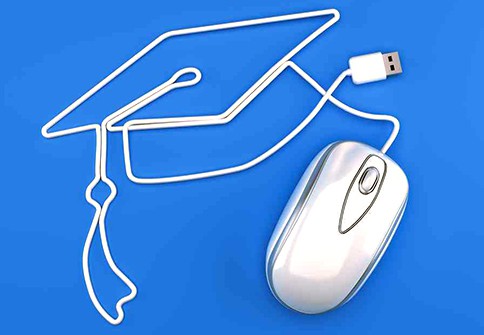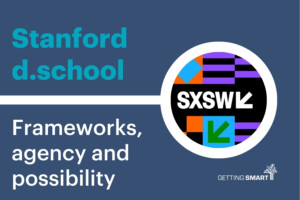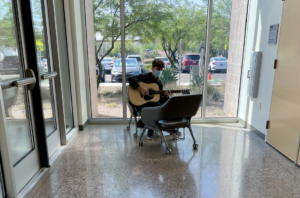Thanks for the Degree, But Your Courses Sucked

I just finished my online degree. The good news is that it was a program that allowed me to learn when and where I wanted. The bad news is that it sucked and it was VERY expensive–I have a mountain of debt and a pile of textbooks I’ll never use.
Because I work with Getting Smart, I have a pretty good sense of what’s possible and what should be available to degree seekers like me. There have been significant advances in online learning for both K-12 and higher education over the past few years that provide flexibility in location, time and pace for students. However, many are still premium priced degree programs that don’t recognize prior knowledge, and lack adequate interaction. My experience led me to conclude that online degree programs should be better in 10 ways:
Have effective instructors. There was a wide spectrum of professor quality while I finished my degree. I had some professors that participated in discussions, provided constructive and helpful feedback and showed their commitment to the class. On the other side there were even more professors that often posted the syllabus on the first day of courses and submitted the pre-drafted rubrics for grading. That is where their participation ended. They didn’t contribute to conversations in the course room and were very “behind the scenes”. It really highlighted that regardless of the environment, traditional, blended, or online — teachers make a difference.
Feature authentic interaction. Most courses had assigned reading, a couple assignments due at the end of the week, and required discussion threads–each response was to include what my classmate’s post had in common with my own, how their post was different and any other feedback I had. While some of these contributions were helpful, most were clearly forced and didn’t contribute to my learning. Most classes lacked team-based projects, socratic discussions, open-ended question and real dialogue.
Provide more than canned feedback. While I don’t mind pre-drafted feedback that explains what is expected for each assignment to earn a “proficient” grade, I think it’s important to give learners customized feedback to help them hone their skills and comprehension. While online education means you’re not having in person interactions with your professors and classmates, constructive feedback on grading rubrics and interactions would help improve learner experience.
Don’t require textbooks. I was required to purchase expensive textbooks for all of my classes including competency-based courses that were supposed to recognize prior skill. Many of these textbooks were new versions so prices were upwards of $200 and a majority weren’t available as an ebook. In a world of technology and digital learning, why on earth are we still printing big bulky textbooks for an online curriculum?
Don’t require assigned reading. I can understand the need for required readings in a traditional course but I was even required to read a certain number of chapters each week for my competency-based courses. These courses didn’t require tests to show competency, instead we were tasked with writing papers based on current business models or researched topics. While this may not be the “traditional” form of competency-based I enjoyed proving mastery this way as I’m a much better writer than test taker.
Respect prior knowledge. I’ve had a series of responsible positions that have included a lot of professional learning experiences–none of that translated into credits toward my degree. Learners should be able to show what they know and progress based on demonstrated mastery.
Leverage work-based learning. I was often doing more relevant work in my day job than I was assigned in class, but that didn’t matter. I wish I could have extended some real life examples for class projects–it would have saved time, improved my learning, and benefited my job performance.
Offer rolling enrollment. All of my classes were offered on a traditional four quarter calendar. Like Florida Virtual, it would have been far more convenient to start classes any week when I was ready.
Update their platform. I spent the last two years in a crummy platform that made logging on and submitting assignments feel like I was in a time warp. There was also a mobile app, but students could only view courseroom activity or review assignment instructions with no ability to post in the courseroom. There were a handful of random “improvements” made to the platform that usually meant the relocation of the discussion post toolbar, small changes to the colors used or the font style. These changes didn’t improve much for me.
Be affordable. Despite being online with little individual attention, each course was over $2000 each, plus the cost of books. New options like College for America cost $2500 per year for as much as you can learn–and that seems like a much better deal.
I’m glad I was able to earn an online degree but there is certainly room for a much better learner experience.
I’d love to hear about your online learning experiences. Were your experiences similar? How did they differ? Add to the comments below and comment online using #onlinelearning.
For more on online degrees, check out:








Bob
I really appreciate this article and insight. Having just returned fro the iNacol Symposium for online and blended teaching, I especially enjoyed reading this. Your 10 steps / suggestions are great. As with any class, it all starts with a dynamic teacher. Online work also must have a powerful, robust, and flexible LMS..looks like your course lacked both a dynamic instructor and LMS. I am baffled that you had to purchase textbooks too; kind of defeats the move to digital.
My girlfriend is currently earning her Master's in Gothic Literature online. I won't name the institution she is receiving the degree from, but the LMS is minimal at best and she has had both strong and weak facilitators / teachers. There hasn't been any collaborative or project based work, although LMS's easily lend themselves for this.
I hope that some organizations can get it together so online opportunities aren't seen in a negative light. They can be great for those who need the distance opportunity or a hybrid approach.
Replies
Tom Vander Ark
Thanks Bob. You're right, a good instructor can make a big difference. It's crazy that some programs require students to buy print textbooks. The good news is options are rapidly expanding and expensive low-engagement programs won't be around for long.
Mark Lonergan
You've made many excellent points here. I'm in an online program at a state school known for its M.Ed. programs, and the instruction has mostly been great. Something to consider is the logistics of authentic interaction won't always work with rolling engagement. Perhaps these could be implemented together at a large institution. However, I've had some classes of fewer than ten students. Rolling enrollment wouldn't have worked in those situations.